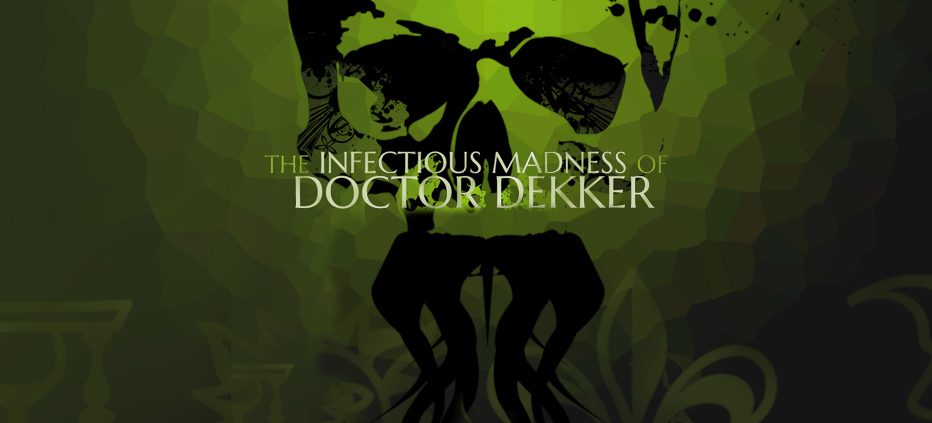The Infectious Madness of Doctor Dekker
Developer: D’Avekki Studios Ltd | Publisher: D’Avekki Studios Ltd | Release Date: 2017 | Genre: Adventure / Indie / Casual / Simulation | Website: Official Website | Purchase: Steam
In theory, being a psychiatrist sounds like the easiest job on earth. You simply sit back and pretend to listen to your patients ramble on about their problems while you doodle in your notepad. Then, after repeating this for a couple of sessions, you blame everything on their mother and collect a nice paycheck. Unfortunately, it doesn’t quite work that way in The Infectious Madness of Doctor Dekker, a new FMV adventure title by D’Avekki Studios Ltd.
The game places you in the role of a psychiatrist who has to step in and treat the patients of the titular Doctor Dekker. Unfortunately, your predecessor met a grisly fate, and all evidence seems to point toward one of the patients being the culprit. This means that you not only have to try and help these patients with their mental issues but also try and uncover which one of them helped Dekker to shuffle his mortal coil. It’s not going to be easy, though, as not only does everyone have a motive for killing the doctor, but digging too deep into the mystery might end up costing you your sanity as well.
Even back in the nineties, when full-motion video games became more common due to the increased storage capabilities of CD-ROMs, the genre didn’t exactly garner a lot of critical acclaim. The fact that most titles ended up being “interactive movies,” which usually translated into lousy acting, poor video quality, and limited interaction, didn’t help either. However, the genre has been seeing a bit of a revival lately, and surprisingly enough, not all of the newer titles are terrible. In fact, TIMODD isn’t just one of the best titles in the genre but also a great game in its own right. This can be chalked up to a couple of factors, the most important of which is that both the story and acting are great.
Like most FMV titles, the gameplay of TIMODD is still rather limited, and your only means of progressing the story is asking your patients questions via a text interface. Ask the right questions, and they will reply in full-screen video using one of the more than 1600 responses in the game. While the number of responses is numerous, they are still finite, which means this game is by no means an AI simulator. Instead, all the reactions are keyword-based, which is both a blessing and a curse. When it works, it works brilliantly, and you really feel like you are interacting with your patients. Unfortunately, when you get it wrong, you’ll become very familiar with the myriad of ways in which patients can tell you that they don’t know what you are talking about.
It can be extra frustrating when you question them about something they just mentioned, and they respond by acting like you are speaking in Latin. Even worse is if you know exactly what you want to ask, but can’t seem to string together the right combination of keywords to trigger a response. Thankfully, the developers have already made several keyword improvements to the game, which helps the experience. In addition, the game also features a hint system that can put you on the right track if you get stuck. There is no penalty for using hints either, although they have a cooldown period dependent on the difficulty level you have chosen.
TIMODD is split up into five therapy sessions where you get to grill the six patients who could be implicated in the murder of Dekker. Interestingly enough, the murderer is randomly chosen at the start of the game, and the experience features multiple endings. Most of the story can be experienced during a single playthrough, but those who want to see all the endings are free to start from scratch and see what new information they can uncover. Along with the regular patients who crop up in every session, you’ll also encounter a couple of other “once-off” characters who function like side quests. Not only are their stories just as interesting as the main characters, but they also provide a nice distraction and can offer valuable clues that tie into the rest of the story.
One area where TIMODD excels is the story, and we are definitely not going to spoil anything in this review. Suffice it to say that virtually all of your patients appear to have symptoms of psychokinesis, which means their problems are anything but ordinary. Making matters even more engaging is the brilliant performances by the actors, and we frequently found ourselves hanging on to every word they said. Aislinn De’Ath, in particular, does a great job portraying Marianna, while Bianca Beckles-Rose shines in the role of your assistant, Jaya. Appropriately enough, the game has a bit of a Lovecraftian theme, so if you dig deep enough into your patients’ problems, you might just end up seeing some bizarre things yourself!
Playing the game is extremely simple, and the interface is very streamlined. All your questions are typed in an input box at the top of the screen, while links to your notes, evidence, and question history can be accessed on the left. The game keeps track of all the relevant questions or keywords you use and displays an asterisk next to these to indicate if follow-up questions are possible. Indicators are also displayed next to the characters’ names to show when you can move on to the next session. You only have to get enough answers from each character to turn their indicator yellow if you want to proceed. Still, you are also free to keep going until the indicators turn green to signify that you have found every response. Doing so can yield a lot of extra information, but it also has consequences. Any answers you get can be replayed to ensure you haven’t missed something, but the game saves automatically, so there is no way to take back what you have said to patients. Our only gripe with the interface, apart from the sometimes frustrating issues it has with keyword synonyms, is the fact that it is also possible to accidentally use keywords that trigger responses that are out of sequence. This can be confusing, to say the least, but luckily, it didn’t happen to us too often.
Considering that TIMODD is an FMV game, the full-screen, high-definition videos look great, and we were impressed by the video quality. Of course, the game comes with a sizable installation due to the amount of videos, which can be an issue for players with slow internet connections or bandwidth limitations. All of these videos are put to good use, though, as you’ll see plenty of full-screen responses from characters and short clips of them performing various actions as they wait for you to interact with them. These clips of the actors fade in and out as their surroundings, which consist of your office wall and a large green couch, remain static. The game also uses framing well to enhance the creepy atmosphere throughout. In addition, the soundtrack is suitably atmospheric and sets the tone for the game without becoming obtrusive.
Overall, TIMODD offers a lot of content and an engaging experience for a surprisingly modest asking price. It is still an FMV game, which means limited interaction and a fairly linear story, but it makes up for this with a great story and superb acting. While some minor niggles detract slightly from the experience, it is still a title that we wholeheartedly recommend to anyone who can appreciate a good story. If you are in the mood for something a little different, then don’t hesitate to pick up this game.
System Requirements
- OS: Windows 7,8,10
- Processor: Pentium 4 SSE2 onwards (dual core)
- Memory: 2 GB RAM
- Graphics: Intel HD3000 or comparable
- Network: Broadband Internet connection
- Storage: 20 GB available space
- Additional Notes: Must be capable of playing full HD videos
- OS: OSX 10.9 onwards, 64 bit
- Processor: Intel
- Memory: 2 GB RAM
- Graphics: Intel HD3000 or comparable
- Network: Broadband Internet connection
- Storage: 20 GB available space
- Additional Notes: Must be capable of playing full HD videos



















